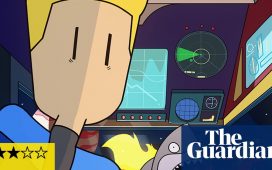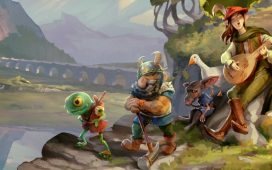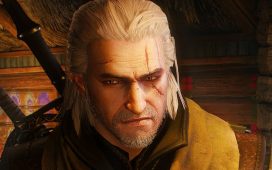Editor’s note: In 2018, the Eurogamer office divided itself into two clear game of the year camps: Team Tetris Effect and Team Fortnite. This year was much less clearly defined, and there were four or five games in serious contention, from the intricacy and grandeur of Sekiro: Shadows Dies Twice to the minimalist purity of Lonely Mountains: Downhill.
It was symptomatic of a year when the major studios and publishers were quiet but the indie scene saw an astonishing explosion of creativity. Some of those indies found a receptive audience on curated subscription services like Xbox Game Pass and Apple Arcade, and it was on Game Pass that our pick for game of the year found a life of its own, spreading virally through players’ breathless stories of discovery.
This was a great year for games that took you places but kept you grounded, grateful for the ground beneath you – and none did that better than Mobius Digital’s bewitching space oddity, Outer Wilds: a pocket universe, perfect for exploration. Happy new year to you and yours, and we’ll see you on the other side. -Oli
Open your eyes. Deep breath. A gasp, really. A gasp of resurrection? Above you in the sky a giant, and near it a hint of complicated disaster – catastrophe. Around you are trees and a friend by the fire. An invitation to toast a marshmallow, and beyond that a spaceship waiting on a homely launch tower. But that thing in the sky, that hint of catastrophe? Sparks outlining a trajectory that seems vital, that seems like a clue, but which has already faded.
Outer Wilds is astonishing, in an era in which you’d think that games would be running out of ways to astonish people. It gives you a clockwork solar system filled with planets whose evocative names are matched by dynamic, tempestuous, mysterious surfaces. It gives you addled, oxbow interiors filled with secrets, with a trail to follow. It gives you physics and memory and logic and sweetness and, in amidst the emptiness, a sense of camaraderie, of belonging to something folksy and pine-scented and cobbled-together with craft and will.
Those planets! One planet eats its twin! Another is a bottled ocean with roving twisters and a terrifying rush of punching tides. One is brittle and dropping inwards on itself. Another is a labyrinth of dimensions and differing scales. And you can land on a comet! A comet!
To describe its pieces suggests a game you could never get your arms or your head around, a swirl of wonders that glitters and disorientates. But all of Outer Wilds can be evoked in that opening moment, I think. Open your eyes. Deep breath. The gasp.
Time loops here, every twenty minutes or so ending with the destruction of the sun and all the planets around it. But then you gasp and open your eyes and you’re back staring up at the sky and that’s all waiting for you in the future. Hopefully you’ve been somewhere. Hopefully you’ve learned something. Hopefully you’re a little closer to understanding what happens in that opening glimpse of drama up above, a broken construction firing a bright charge into space as it orbits a watery giant.
That moment, that glimpse of end-game complexity, starting off each jaunt into the unknown: it tells you so much. It tells you that this place can be understood. It can be solved. And you can do it. And really, the time limit means that there is no time limit. In each life you can do whatever you want, follow whichever instincts you wish to follow, visit whichever planet, touch down and narrow your focus as you please. Move your little lens of life and ingenuity and bright focus over the shifting surface of this map.
What drives you? What drove me was a sense of learning something about Earth, as it happens. Earth I’m reminded of by the pines and valleys of the starter world with its wooden houses and campfires and twills of smoke drifting into the sky. But Earth that was also never as fortunate as this place – a place which, yes, is doomed to die in a few minutes, but which is also so approachable, even the most distant planet snugly within reach and filled with reasons to go there.
Reading about exo-planets I always think about starting points in games. Games like Civ, like Alpha Centauri, Minecraft. The dice rolls and what do you start with? What resources do you have to hand? How close are you to barbarians, to an enemy, to a source of wonder? There are solar systems up there where four rocky worlds or more sit within the Goldilocks zone of habitability. That is something to think about. A starting point to envy, perhaps – or to fear.Hopefully a place where creatures will be born on one planet and have no question as to whether they are alone in the universe, where they can work on reaching out to neighbors whose lights they can see burning in the night sky.
Outer Wilds allows a glimpse of this, I think. No Man’s Sky once asked, what if the universe was very, very big and desolately procedural? But it already is, or at least it might as well be. Outer Wilds asks, hey, what if the universe was as small as summer camp? And what if its mysteries were summer camp mysteries, natural and dynamic and solvable over the course of a few days of poking about in the cosmic bracken?
And more: it tells you that a place is not just a location but a specific moment in time, that this universe of ours is a churning, chugging, changing universe. I love this game. I don’t think I’ll ever be quite free of it. Open your eyes. Deep breath. Gasp.














